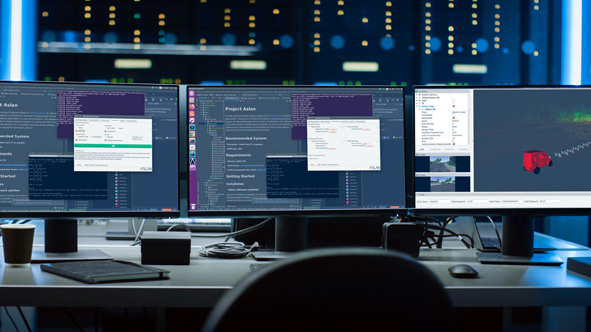Aslan roars with self-driving platform for cities
- July 7, 2020
- Steve Rogerson

Project Aslan, an international collaboration to accelerate the commercial viability of autonomous vehicles in cities, has launched a fully functional open-source self-driving platform.
The international, not-for-profit collaboration between technology companies, universities and public authorities aims to accelerate the viability of low-speed urban autonomous transport by applying open-source self-driving software to improve quality of life and prosperity for metropolitan citizens.
The collaboration’s founders come from Australia, Asia-Pacific and Europe, and they invite additional capability from self-driving software development companies, technology universities, transport authorities, cyber-security experts and self-driving hardware engineers
The potential social, commercial and environmental benefits of autonomous mobility that have the capability to transform gridlocked and polluted cities are not being realised quickly enough. Project Aslan says it aims to solve this problem.
To accelerate the progression of driverless technology, Project Aslan launched an open-source and rapidly deployable self-driving software platform. The free and open software stack has been launched to foster engineering collaboration. The platform provides mature and stable code combined with plug-and-play ease of use, offering real-world self-driving capability validated by public highway trials as well as complete simulation capability for users without access to driverless vehicle hardware.
“We have designed the Aslan platform to be highly usable, fully functional and configurable, providing end-to-end self-driving software implementation,” said Efimia Panagiotaki, who leads Project Aslan’s technical steering committee. “The modular architecture along with the deployment support provided, allows developers to build their own features on top of a stable and well-documented stack. I believe it is everything an engineer would need to commence self-driving software development and, from today, it is freely available to all.”
The collaboration’s founder members and advisory board represent a spectrum of skills and include Han University of Applied Sciences, lidar technology company RoboSense, end-to-end urban mobility firm StreetDrone, and cyber-security expert Enkrypta. Individuals include Jim O’Reilly from Ordnance Survey, Siraj Ahmed Shaikh from the Institute of Future Transport & Cities (IFTC) at Coventry University, Garry Staunton of Race (Remote Applications in Challenging Environments) as part of Testbed UK, and Hai Vu from Monash University in Australia.
“Open-source has been an approach that has led to quantum shifts in development, from the complete re-definition of how the world manages servers using Linux to the huge strides Open Robotics have achieved in robotic technology with ROS,” said Hai Vu. “I am confident that Aslan will achieve the same success by catalysing the progression of slow-speed driverless solutions for the world’s cities.”
Project Aslan believes the investment demands required to pursue end-to-end driverless technologies present a clear barrier to progress. The project has set itself the ambition to remove these barriers to entry and prioritise the benefits of driverless vehicles for metropolitan and low-speed use cases where the benefits are the greatest and a collaborative approach is already determined by the involvement of multiple public agencies and private companies.
By focusing on a more defined operational domain based on slow speeds in cities as well as embracing an open-source approach, the project opens up a smaller problem to a far larger group of collaborative engineering capability from across the world.
Engineers can freely download the open-source resource enriched by software contributed by the founders and augmented with data from 22 autonomous vehicles deployed in trial use-cases in locations from Hong Kong to the UK.
“The fundamental objective of Project Aslan is to focus the power of engineering collaboration on a very defined controlled speed urban use case to enable fast deployment of self-driving solutions,” said Mike Potts, CEO of StreetDrone. “The group that has set this initiative underway welcomes new companies and individuals who share Aslan’s ambition as the promise of autonomous vehicles has been unfulfilled for too long. Collaboration and Project Aslan are the remedy for that shortcoming.”
Project Aslan is aligned with the World Economic Forum “Guidelines for City Mobility” paper published in March 2020 that sets out the ambition for cities and communities to lower emissions, improve safety and increase affordability and accessibility of transport networks based on a first principle of data sharing and collaboration.
The free and open-source resource is a complete self-driving platform that is easy to install, fully documented and contains a stable collection of software packages. With its own graphical user interface enabling plug-and-play deployment, the tooling is intuitive and has been designed by engineers, for engineers and includes a set of video tutorials and quick start guides with a promise that users can install and run an autonomous vehicle or an integrated simulation in under 30 minutes.
Aslan uses the ROS framework, the power behind millions of robot in many applications, providing the estimated user community of up to 16,000 automotive and self-driving engineers and developers already using ROS with familiar middleware.
“We are very honoured to join Project Aslan and contribute to global low-speed autonomous driving development,” said Mark Qiu, COO of RoboSense. “The project will allow us to share our accumulated knowledge with the lidar and autonomous driving industry to aid human safety and increase the efficiency of smart cities alongside other project members.”





